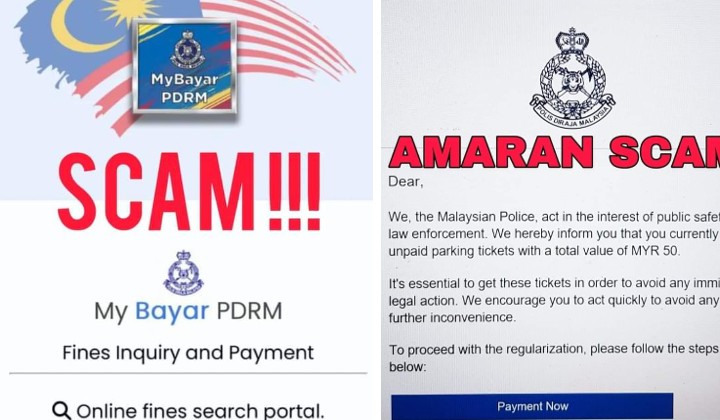Scam Alert: PDRM Logo Used to Trick Malaysians into Paying Fake Traffic Fines
The scammers send emails claiming that the recipients have unpaid traffic fines and must pay immediately or face legal action.

Subscribe to our FREE Newsletter or Telegram channel for the latest stories and updates.
Malaysians are being targeted by scammers with increasing frequency.
The Royal Malaysian Police (PDRM) has warned about a new email scam that uses the official PDRM logo to deceive recipients into paying fake traffic fines.
The Traffic Investigation and Enforcement Department (JSPT) discovered the scam, which found that scammers were sending emails to individuals claiming that they had unpaid traffic fines and needed to pay immediately or face legal action.
The emails include a link to a payment page, which asks victims to enter their personal and banking details.
JSPT has advised the public to be vigilant and not fall for such scams, as PDRM does not conduct payment transactions via email.
Scammers operate with relative ease
This is just one of many scams that have been reported in Malaysia in recent years.
According to a Malaysian Communications and Multimedia Commission (MCMC) report, cybercrimes increased by 83% in 2020 compared to the previous year, with phishing scams being the most common attack.
In addition to email scams, Malaysians have fallen victim to phone, investment, and online shopping scams.
Phone or “Macau scams” involve scammers calling victims and posing as police officers or bank officials.
Awas! Elakkan diri anda daripada menjadi mangsa Macau Scam. Jangan mudah terpedaya.
— ntv7malaysia (@ntv7malaysia) August 10, 2023
Sumber: @mof_malaysia pic.twitter.com/TlQzkElLiy
They then convince the victim to transfer money to a designated account, claiming that avoiding legal action or protecting their assets is necessary.
According to a report by NST, these scams have caused losses of up to billions in recent years.
Investment scams are another common type of fraud in Malaysia, with scammers promising high returns on investments in various schemes such as forex trading, cryptocurrency, and gold trading.
Many victims have lost their life savings in these scams, which often involve sophisticated marketing tactics and fake testimonials.
MALAYSIA: Police arrest 101 believed to be carrying out fraudulent online investment activities at two premises in Selangor. Syndicate used name ‘GCM Asia’ offering investment packages in forex, gold, oil & stocks. https://t.co/W1LZGlV5ha
— CyberScamMonitor (@CyberScamWatch) August 16, 2023
Online shopping scams are also rising in Malaysia, with scammers setting up fake online stores and advertising products at low prices.
Victims who make a purchase are either sent counterfeit or low-quality goods or never receive anything at all.
In light of these recent incidents, Malaysians need to remain vigilant and take steps to protect themselves from online scams.
This includes being cautious when receiving unsolicited messages or emails, verifying the authenticity of any requests for payment or personal information before responding, and reporting suspicious activity to the authorities.
Noob scammer. Some of the scams these days are very believable though, so be careful!
— Bolehlandnet (@Bolehland_net) August 15, 2023
Gintama and Dragon Ball UT is on sale in Uniqlo! – https://t.co/RV5XWxGLgM #scam #message #bank #money #malaysia #bolehland #comics pic.twitter.com/RmgmAOCEwD
By staying informed and being cautious, we can all help to prevent cybercrime and keep our personal information safe.
If you suspect a scammer has targeted you, you must immediately report the incident to the relevant authorities.
READ MORE: Clerk Loses RM250,000 In Phone Scam After Being Threatened With Arrest
READ MORE: Chinese Female Tourist Scammed Of RM4,500 At KLIA
Share your thoughts with us via TRP’s Facebook, Twitter, Instagram, or Threads.

